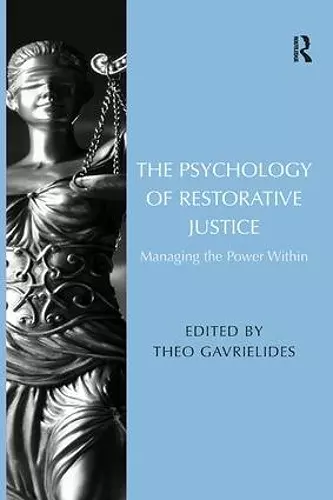The Psychology of Restorative Justice
Managing the Power Within
Format:Paperback
Publisher:Taylor & Francis Inc
Published:22nd Nov '17
Currently unavailable, and unfortunately no date known when it will be back
This paperback is available in another edition too:
- Hardback£145.00(9781472455307)

This ground-breaking collection dares to take the next step in the advancement of an autonomous, inter-disciplinary restorative justice field of study. It brings together criminology, social psychology, legal theory, neuroscience, affect-script psychology, sociology, forensic mental health, political sciences, psychology and positive psychology to articulate for the first time a psychological concept of restorative justice. To this end, the book studies the power structures of the restorative justice movement, the very psychology, motivations and emotions of the practitioners who implement it as well as the drivers of its theoreticians and researchers. Furthermore, it examines the strengths and weakness of our own societies and the communities that are called to participate as parties in restorative justice. Their own biases, hunger for power and control, fears and hopes are investigated. The psychology and dynamics between those it aims to reach as well as those who are funding it, including policy makers and politicians, are looked into. All these questions lead to creating an understanding of the psychology of restorative justice. The book is essential reading for academics, researchers, policymakers, practitioners and campaigners.
’In this volume, we really have a chance to see the richness of what real psychology can be - even qualitative, activist and theoretical. This is great news for psychology and great news for justice studies to see just what we can learn from the oldest social science. Leave it to restorative justice (again) to lead the way in breaking this important, new ground.’
Shadd Maruna, Rutgers University Newark, USA
’Gavrielides’ edited collection revolutionizes our understanding of restorative justice through its multidisciplinary, global and comprehensive approach. Despite the volumes written on this topic and billions spent by governments to implement restorative justice programs, the concept remains poorly understood and inconsistently implemented. Through both a theoretical and empirical framework, the authors in this collection discuss critical issues in restorative justice policies and practices and offer a cohesive understanding of the restorative justice movement. I highly recommend this book for academics, practitioners and policy-makers alike.’
Karen Terry, John Jay College of Criminal Justice, USA
’Full of lively chapters that demonstrate that it’s not difference that divides practitioners but silence, The Psychology of Restorative Justice offers a range of multi-disciplinary voices that challenge complacency, invigorate debate and articulate what future next steps might be.’
Lorraine Gamman, University of the Arts London, UK
’Justice, in Plato's The Republic, means harmony, both internal, in the form of the soul, and external, in the form of the state. Restorative Justice, therefore, harmonizing the victim with the offender, is justice par excellence. Theo Gavrielides' new collective volume is the epitome of harmony in conflictual situations, in theory and practice, and in psychological perspectives, including the latest research in neuroscience.’
Calliope Spinelli, University of Athens, Greece
'Nils Christie invited us to be provocative, creative and critical in seeking justice for those in conflict with the law and each other. He believed that the power of the state, alone, could not deliver justice; he believed in the power within each of us to own our conflicts. This book is a testimonial to that conviction, grounded in the latest praxis across disciplinary domains. It is a must read for anyone interested in the limits and human potential of restorative justice.'
Brenda Morrison, Simon Fraser University, Canada
‘Howard Zehr suggests that “Restorative Justice is not a map but the principles of restorative justice can be seen as a compass pointing a direction”. With this book the authors point the readers in a new direction, namely to explore restorative justice through a multi-disciplinary lens. By stimulating the discourse about how restorative justice as well as its practices and approaches can bring about justice (restoration) on a deeper level than its current application within a legal paradigm, this book inspires continued debate that transcends the existing boundaries of what we understand restorative justice to be. This is indeed a pioneering and exciting direction.’
Marelize Schoeman, University of South Africa, South Africa
ISBN: 9780815391975
Dimensions: unknown
Weight: 453g
296 pages